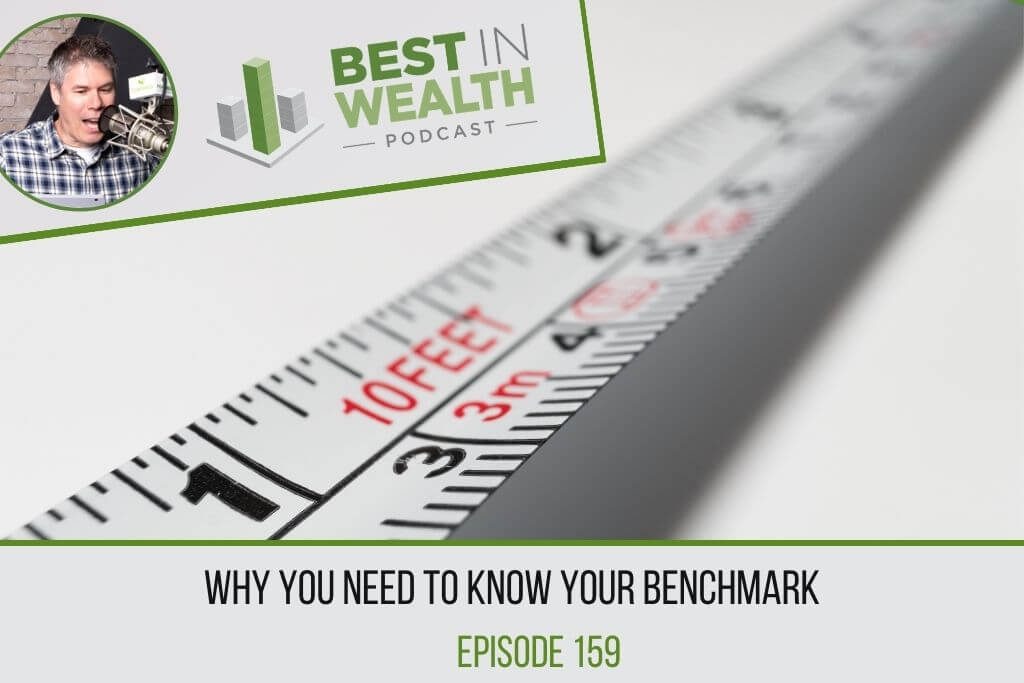Why You Need to Know Your Benchmark, Ep #159

What is a benchmark? Why is it important to be familiar with what your benchmark is? How can it impact the decisions you make? In this episode of Best in Wealth, I walk you through why it is so important to know your benchmark. I guide you through how to figure out which benchmark to follow and break down why you need to rethink your strategy. Do not miss this important episode!
What is a benchmark? Why is it important to know what your benchmark is? I share more in this episode of Best in Wealth! Don’t miss it! #wealth #retirement #investing #PersonalFinance #FinancialPlanning #RetirementPlanning #WealthManagement Click To TweetOutline of This Episode
- [1:50] Scams are running rampant
- [5:43] The most common benchmarks
- [8:07] Why it is time to rethink your strategy
- [9:58] Look at other asset classes
- [13:08] Why you need to know your benchmark
- [18:31] Do not be chasing the hot dot
- [19:55] Do you have an investment policy statement?
The most common benchmarks
We always hear about the common benchmarks or indexes such as the Dow Jones, The S&P 500, and the NASDAQ. The Dow Jones consists of 30 large companies representing different sectors in the United States. The S&P 500 is the 500 largest companies in the US. The NASDAQ consists of tech-heavy stocks. But none of them represent every asset class you can invest in. None of these are how your portfolio should look.
You might have an index fund in your portfolio tracking one of these indexes. If so, your return might be pretty good in 2020. It would be a little over 14% as of December 17th, 2020 (minus the fund cost). A lot of people look at 14% and think that’s the benchmark for their portfolio. I am going to walk you through why that is not the case—or should not be.
Why it is time to rethink your strategy
The S&P 500 averages 10% per year. If you are following that with your portfolio, you have gained 10% minus fund expenses. But research shows that these traditional active management funds do not do as well as the index. Only 23% have beat the index. If you are just in the S&P 500, you have to consider longevity. You can see very dark times for a long period of time if you are only invested in one asset class. For example, from 2000–2009 the S&P 500 averaged -1% per year. If you started retirement with $1 million and you only invested following the S&P 500 for 10 years, you lost $100,000 in 10 years. Look at other asset classes.
Why do you need to rethink your strategy when it comes to tracking benchmarks? I share my thoughts in this episode of Best in Wealth! #wealth #retirement #investing #PersonalFinance #FinancialPlanning #RetirementPlanning #WealthManagement Click To TweetLook at other asset classes
There are thousands of companies that trade in the U.S. You might want to look at another index fund that tracks the Russell 2000. It is doing pretty well this year, but people never reference it. Russell 2,000 was down most of the year but is now up over 10%. What about a large value fund? They may look at the top 1,000 companies. Your benchmark would be the Russell 1,000 Value Index (it is down 1% this year). What if you are investing internationally? You might be tracking the MSCI World Index (that excludes the US). It is up 2.91% as of 11/30/2020. What about emerging markets? What about real estate? If you are in any of these asset classes, your benchmark is not the S&P 500.
Why you should not chase the market
Are you looking at your 401k or IRA and seeing less of a gain than the S&P 500? When the market dropped a lot in March, most people did not get out of the market. However, a lot of people have been chasing returns ever since. They try to make changes in their portfolio to track the S&P 500—when it is not their benchmark. That has cost investors millions and millions of dollars.
What if your 401k was tracking US Small Value? US Small Value was about even for the year as of October 1st, 2020—severely underperforming the S&P 500. So let’s say you decided to make a change and get into a different mutual fund to chase the performing indexes. But what happened? Now, it is 11/30/2020, and the S&P 500 is up 10% in two months. You are patting yourself on the back. But what about the small-value space that you were in? It’ is up 32.5% since October 1st. If you had stayed disciplined and had patience, your money would have grown significantly more.
What can you do instead of chasing the market? How do you determine what index is your benchmark? What other things can you do with your portfolio? Listen to hear my thoughts!
I share WHY you shouldn’t chase the market in this episode of Best in Wealth! Listen to learn why it’s NOT the best strategy for your investments! #wealth #retirement #investing #PersonalFinance #FinancialPlanning #RetirementPlanning… Click To TweetConnect With Scott Wellens
- Schedule a discovery call with Scott
- Send a message to Scott
- Visit Fortress Planning Group
- Connect with Scott on LinkedIn
- Follow Scott on Twitter
- Fortress Planning Group on Facebook
Podcast Disclaimer:
The Best In Wealth Podcast is hosted by Scott Wellens. Scott Wellens is the principal at Fortress Planning Group. Fortress Planning Group is a registered investment advisory firm regulated by the Securities Act of Wisconsin in accordance and compliance with securities laws and regulations. Fortress Planning Group does not render or offer to render personalized investment or tax advice through the Best In Wealth Podcast. The information provided is for informational purposes only and does not constitute financial, tax, investment or legal advice.



